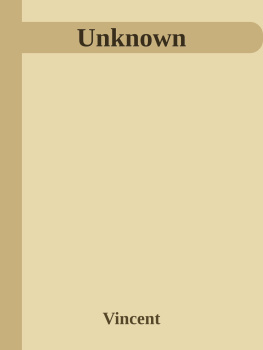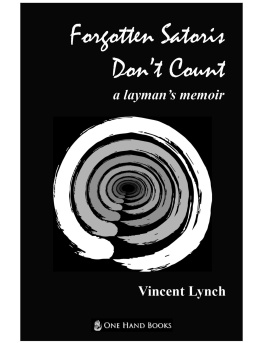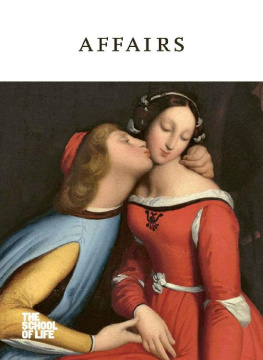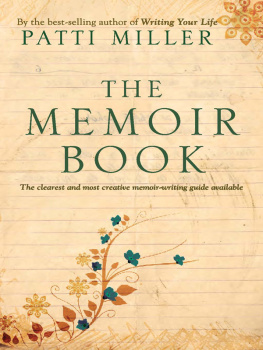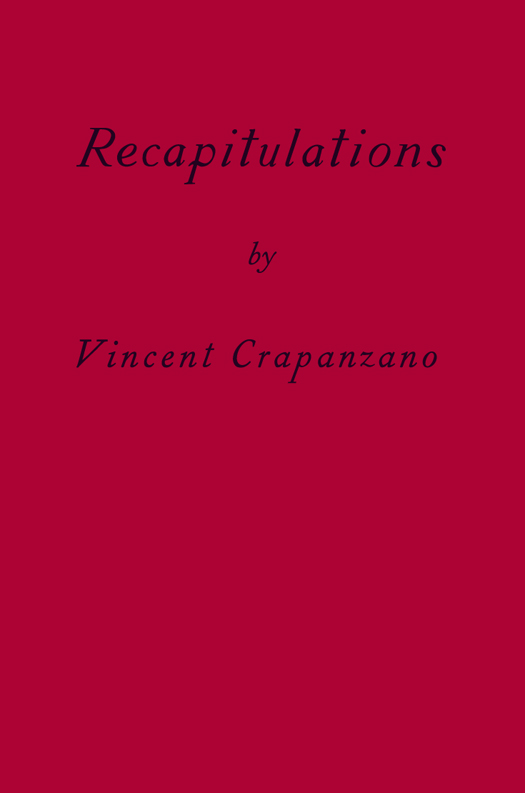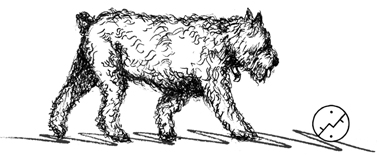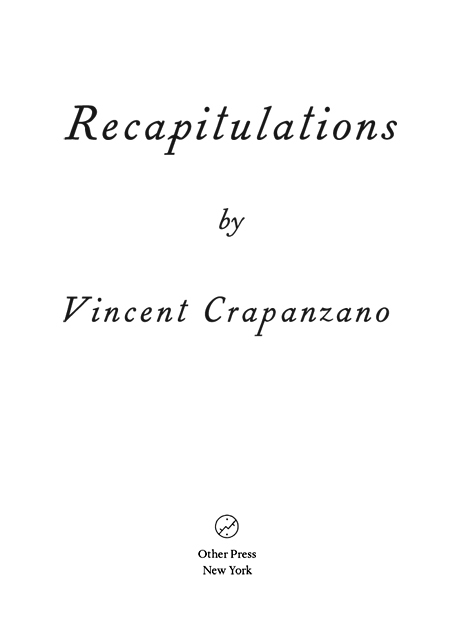ALSO BY VINCENT CRAPANZANO
The Harkis:
The Wound that Never Heals
Imaginative Horizons:
An Essay in Literary-Philosophical Anthropology
Serving the Word:
Literalism in America from the Pulpit to the Bench
Hermes Dilemma & Hamlets Desire:
On the Epistemology of Interpretation
Waiting:
The Whites of South Africa
Tuhami:
Portrait of a Moroccan
The Hamadsha:
A Study in Moroccan Ethnopsychiatry
The Fifth World of Forster Bennett:
Portrait of a Navajo
Copyright 2015 by Vincent Crapanzano
Production Editor: Yvonne E. Crdenas
All rights reserved. No part of this publication may be reproduced or transmitted in any form or by any means, electronic or mechanical, including photocopying, recording, or by any information storage and retrieval system, without written permission from Other Press LLC, except in the case of brief quotations in reviews for inclusion in a magazine, newspaper, or broadcast. For information write to Other Press LLC, 2 Park Avenue, 24th Floor, New York, NY 10016. Or visit our Web site: www.otherpress.com
The Library of Congress has cataloged the printed edition as follows:
Crapanzano, Vincent, 1939
Recapitulations / by Vincent Crapanzano.
pages cm
ISBN 978-1-59051-593-8 ISBN 978-1-59051-594-5 (ebook)
1. Crapanzano, Vincent, 1939 2. College teachers
United StatesBiography. 3. Anthropologists
United StatesBiography. 4. Authors, American
20th centuryBiography. I. Title.
LA2317.C23A3 2015
378.12092dc23
[B]
2014027388
Disclaimer: The names and identifying characteristics of certain individuals in this work have been changed to protect their privacy.
v3.1
forJANE
In memory I meet myself.
SAINT AUGUSTINE
But do I? Do I ever?
CONTENTS
I.
ORIGIN
STORIES
M Y PARENTS taught me that it was rude to ask someone what he or she did for a living. Even today, when I am doing fieldwork Im an anthropologist and have to ask people I work with what they do, I feel a slight constriction in my throat. I imagine that my question comes out at a noticeably higher pitch than normal.
When I am asked what I do, I have several answers. I teach. Im a professor. I write. Im an anthropologist. Im an anthropologist, but I also teach comparative literature. Each of these answers elicits a particular response. What do you teach? Where do you teach? What do you write? I took a course in anthropology in college. I thought about becoming an anthropologist. That must be exciting. Anthropology and comparative literature, how interesting. I dont see the relationship. I do see the relationship. Did you know Margaret Mead?
You are rarely asked how you decided to become a doctor, a lawyer, an investment banker, a consultant (whatever that means), an architect, an actor, an artist, a diplomat, or a taxi driver. But when you say that you are an anthropologist, you are (at least I am) always asked how you decided to become one. What a nuisance! How do you ever know how or why you became anything? All we can do is tell ourselves, tell others, a story that if we have not conned ourselves we know is a bit of a fiction. Its a way not only to answer the question or define yourself, but also to stop questions that ultimately lead nowhere or somewhere you dont want to be even if you are there. Its an origin story, a kind of myth, which, like all myths, is an artifice that denies its own artifice. Myths can have no irony.
I have several origin stories that I deploy according to the circumstances in which I find myself. None are true. None are false. Some are pertinent. Some are impertinent. Sometimes I say that I went to an international school in which the students came from eighty-five different countries. I have, in fact, no idea how many different countries they came from a lot, I know but I always say eighty-five. Eighty-five does not have, as far as I know, any special meaning for me. I say it was at that school that I became aware of cultural difference. I usually reserve this story for people I find uninteresting. Sometimes I say that I spent the first thirteen years of my life living on the grounds of a mental hospital (before explaining that my father was a psychiatrist attached to the hospital), and that it was there I became intrigued by the range of human behavior. Usually I tell this to people whom I want to shock. Sometimes I talk about a little book of pictures of American Indians from different tribes that fascinated me as a child. What I dont say is that I could never remember all the tribal names.
Often I add if I like the person who has asked me that one of my fathers patients was an archeologist who walked me through the woods behind our house, looking for arrowheads. We always found some. I remember one in particular. It was a mustard brown, what the French call jaune, beautifully carved, softer and less sharp than the flint arrowheads we usually dug up. I wonder where it is now. It was uncanny how the archeologist always knew where to find arrowheads. One day I think it was the day we found the brown one my mother and father laughed when I showed it to them, and said that the archeologist had probably buried it. I wouldnt believe them. They said it was okay. I was still learning about the Indians and had a fine collection of arrowheads. Perhaps I would become an archeologist. But the next time I went out with the archeologist I cant remember his name we came to a meadow where I often played cowboys and Indians with my school friends Freddy and Bob, and sometimes Jimmy. The ground was uneven, and the archeologist said that the hillocks were mounds under which the Indians had buried their dead. I wanted to start digging right away, but he said we had to have permission. It was the first time I looked directly at his face. He had pale blue eyes, very thin lips that were twitching slightly, and, I think, a gray mustache. His eyes were empty well, perhaps not empty but ever so slightly, blankly, fearful. I had the feeling that I had pushed him too far, that he didnt know how to get out of the trap he had got himself in. I never saw him again.
I didnt really want to see him again, but I asked my mother why I was not allowed to. She said he was having one of his episodes and couldnt leave the ward. Having one of his episodes was my mothers way of saying that he was in a psychotic crisis, what Clara, my nanny (though we never called her a nanny), called a spell. Clara was also a patient. She, too, had spells. She would see faces in the hoarfrost on the kitchen windows, and she never ate bananas because the seeds in their centers were crosses. Of course, I usually dont go into this much detail. When you are writing to readers whom you dont know, you are freer to elaborate to flutter around fiction. Fiction can sometimes be truer than nonfiction: a clich, I know, but one that calls attention to a dimension of the quest for truth that my literalist colleagues and the Christian Fundamentalists I once worked with have to deny. There is no ethnography I might as well say it now that is free of the fictional.



